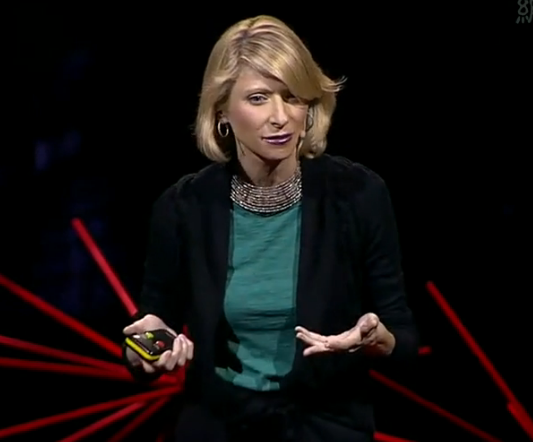(单词翻译:单击)
演讲文本
So the second question really was, you know, so we know that our minds change our bodies,
第二个问题就是,我们知道心理状态会影响我们的身体,
but is it also true that our bodies change our minds?
那身体是否能影响心理呢?
And when I say minds, in the case of the powerful, what am I talking about?
这里所说的心理充满力量,究竟指的是什么?
So I'm talking about thoughts and feelings and the sort of physiological things that make up our thoughts and feelings,
我指的是想法和感觉,以及可以组成我们想法和感受的实际事物,
and in my case, that's hormones. I look at hormones.
我这里是指荷尔蒙。我指的是这个。
So what do the minds of the powerful versus the powerless look like?
充满力量和没有力量的心智,是什么样的呢?
So powerful people tend to be, not surprisingly, more assertive and more confident, more optimistic.
毫不令人意外,心理坚强的人往往比较果断、自信且乐观。
They actually feel they're going to win even at games of chance.
就连在赌注里也觉得他们会赢。
They also tend to be able to think more abstractly. So there are a lot of differences. They take more risks.
他们也倾向于能够抽象地思考。所以这其中有很大区别。他们更敢于冒险。

There are a lot of differences between powerful and powerless people.
充满力量与充满无力感的人差别真的很大。
Physiologically, there also are differences on two key hormones:
在生理上,有两个重要的荷尔蒙对此有影响:
testosterone, which is the dominance hormone, and cortisol, which is the stress hormone.
一个是睾酮,是一种支配性荷尔蒙,另一个是皮质醇,是一种压力荷尔蒙。
So what we find is that high-power alpha males in primate hierarchies have high testosterone and low cortisol,
我们发现,灵长类里的雄性首领有大量的睾酮和低量的皮质醇,
and powerful and effective leaders also have high testosterone and low cortisol.
强势,高效能的领袖人物也有大量的睾酮与低量的皮质醇。
So what does that mean? When you think about power, people tended to think only about testosterone, because that was about dominance.
这意味着什么?当你想到力量,人们往往只想到睾酮,因为它代表支配统治。
But really, power is also about how you react to stress.
但力量其实也和如何处理压力有关。
So do you want the high-power leader that's dominant, high on testosterone, but really stress reactive? Probably not, right?
所以你会想要一个有着很高浓度的睾酮,但同时又高度紧张的领导吗?大概不会吧,不是吗?
You want the person who's powerful and assertive and dominant, but not very stress reactive, the person who's laid back.
你会希望那个人是充满力量,肯定果断且非常强势,但也不会对压力反应过度,不能轻松以对。
视频及简介
演讲简介:
肢体语言影响着他人对我们的看法,但同时它也影响着我们对自己的看法。社会心理学家Amy Cuddy表示“有力的姿势”--以一个自信的方式站着,即使我们不感到自信--他们也能够影响我们脑内的睾丸酮和可的松含量,甚至可以爆发性地推动我们成功的机会。


